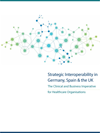 The aging population and increasing incidence of chronic diseases are putting unmanageable pressures on healthcare services, not just in Europe, but worldwide. The current models of healthcare are unsustainable in the face of increased demand for services and rising costs. This was evident even before the financial crisis led to severe cuts in healthcare budgets in many countries.
The aging population and increasing incidence of chronic diseases are putting unmanageable pressures on healthcare services, not just in Europe, but worldwide. The current models of healthcare are unsustainable in the face of increased demand for services and rising costs. This was evident even before the financial crisis led to severe cuts in healthcare budgets in many countries.
Patients are increasingly relying on multiple specialists and healthcare organisations for treatment, due to the complexity of their medical conditions and the healthcare delivery system itself. Care providers need accurate, up-to-date, and reliable information from a complete patient record to deliver safe, high-quality care. Today's model, with its silos of care and multiple unconnected records, is no longer suitable: systems and organisations need to be interoperable. This means that healthcare organisations must look at interoperability from a strategic point of view so that information is available when and where it's needed across the continuum of care. Health and social care organisations will have to adapt to the changing environment in order to provide the best care for patients - and to survive financially.
Download: Strategic Interoperability in Germany Spain and the UK: The Clinical and Business Imperative for Healthcare Organisations (.pdf, 1.055 KB).
Download from eHealthNews.eu Portal's mirror: Strategic Interoperability in Germany Spain and the UK: The Clinical and Business Imperative for Healthcare Organisations (.pdf, 1.055 KB).